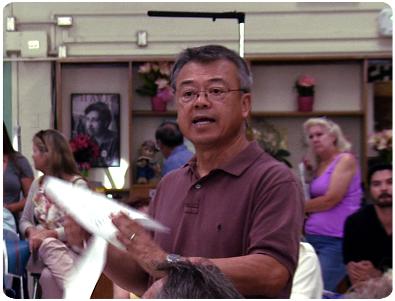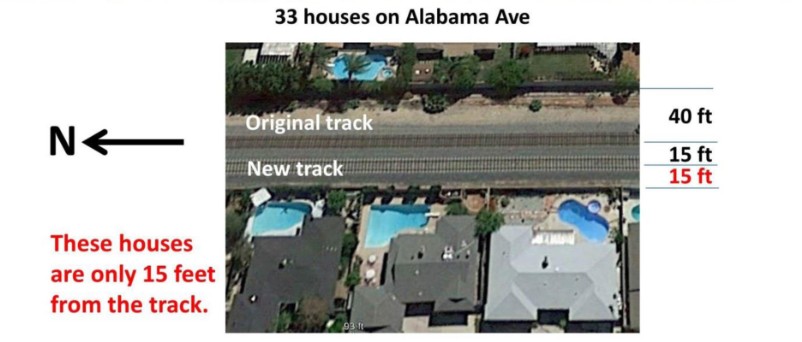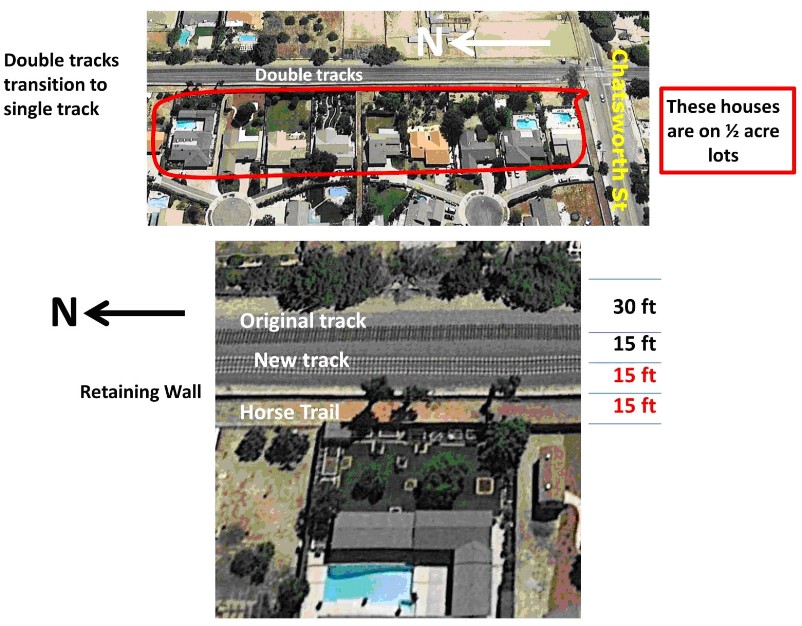Chatsworth Sham - No Double Track, Citizens Against Double Track, Northridge Citizens For Environmental Justice
Main menu:
- Home Page
- Separator 3
- PRESS
- SAFETY?
- THE RUNAROUND
- BAD VIBRATIONS
- Video Voices
- Separator 4
- Back Story
- EIR/EIS
- CEQA
- Separator 1
- Key Supporters
- Separator 2
- Political Track
- Chatsworth Sham
- Devalued
- Separator 5
- YOU CAN HELP!
- Separator 6
- CONTACT
- Members Only
Chatsworth Sham
Steering Committee member and valued contributor Tak Yu recently interviewed residents in the city of Chatsworth whose lives were recently thrown upside down by Metro when Metro unceremoniously decided to install a Second Track so close that trains pass within 10 feet of their property lines. These people were thunderstruck to discover that such an unsafe action was even legal. To any person of conscience of course, this sort of dangerous proximity between massive locomotives and residences should NOT be legal. Who could imagine such a thing could happen in the United States, or in any civilized society for that matter, outside of a Third World dictatorship.

In the page below, Tak outlines the information he obtained from personally interviewing residents in this recently scandalized community, their quality of life torn asunder by Metro's callous disregard for their well being.
Tak's first and most startling observation was that a Second Track, in this case a Track Siding, was installed so close that trains actually pass within 10 feet of some residential property lines in the area. In his own words, he describes what he saw and what he learned from the residents living there:
*************************************************************************************************************************
I mentioned that the backyard block walls of the houses in Chatsworth are only 15 feet from the track. For curiosity, I went to talk to residents on Alabama Ave, between Chatsworth St and Devonshire St two days ago, 9/06/2015:
I interviewed 18 residents out of 33 homes … about 70% homeowners and 30% renters. A few homeowners have lived there about 50 years. I asked everyone about the 15 feet track setback, traffic condition, environmental impact, transportation of cargos/crude oil, and Bonin’s effort to stop railing crude oil to Los Angeles. My questions and their comments are shown below:


1. Why the track is so close to all the houses on the west side?
--About 15 years ago, they were notified by Metro that they would build a second track. Residents protested and had a meeting with Metro. Metro stopped the project for a number of years, but later built the 2nd track without informing the residents. (To be verified with the Chatsworth Homeowners Association)
--Residents claimed they did not have good leaders to fight against Metro. By the time they found out about the construction of the new track, it was already installed. They could not fight against Metro to uninstall it.
--A person mentioned that there was a law suit against Metro, to seek for compensation after Metro installed the new track. He didn’t want to wait for the compensation because Metro was giving residents a difficult time to provide the required documents. The compensation was very little … not worth filling out all the required documents. He mentioned about $2,000 - $3,000. (To be verified with the Chatsworth Homeowners Association)
--All residents are angry about Metro's behavior with the construction of the 2nd track, but they cannot do anything about it. Many residents didn’t know they installed the new track. They don’t understand why the setback is only 15 feet and why didn’t Metro install the track on the other side, where the space is wider.
2. What is the train traffic condition?
--It is very bad especially in the early morning.
--One train stops to wait for the opposing train to pass through.
3. Does the noise bother you?
--Terrible … they blow the air horn all the time from Rinaldi to Devonshire. They even do it at mid-night and early morning. My children rush inside the house when they blow the horn.
--The double pane windows help to reduce the noise. They have lived there many years and they are kind of used to it, but once in a while, the loud noise around mid-night still wakes them up.
--When they blow the air horn, it may cause someone to fall from a ladder or the roof.
4. Does the vibration bother you?
--Terrible … it's like an earthquake. One person made a deep trench near the block wall and filled it with sand. He said it helped a little.
--Some residents are already used to it and said it is OK.
--One person showed me cracks in the block wall and concrete slabs. Another person said there are also cracks in his swimming pool.
--Freight trains caused stronger vibrations. They can tell when the trains are fully loaded.
5. How else does the train bother you?
--Lack of privacy … When the train stops to wait for the opposing train to pass through, they can see us in our swim suits, and we can see them too. The train is just too close to our house; especially since it is on a raised bed about 5 feet higher than our backyard
--Air pollution… The air smells awful when the train stops and plants are dying.
--Reduced property values… What can we do?
--Safety issues… What can we do?
--Health issues… What can we do?
6. Do you know what freight trains carry?
--They carry cargo, chemical, oil, etc.
--They had seen oil tanks, military transports, etc.
--In their area, the freight train usually runs slow.
7. Have you heard of L.A. Councilmember Mr. Mike Bonin’s resolution to stop the rail transportation of crude oil to Los Angeles?
--They have never heard of this news. So, I told them about it.
--They understand it is very dangerous but what can they do? They are scared!
--They are willing to support anything that would improve their living condition.
--One person asked “Will the gas price go up if they transport crude oil with trucks?” I recommended that they use ships or pipelines.
*************************************************************************************************************************

I asked them about the 2nd track addition, traffic conditions, environmental impact, transportation of cargos/crude oil, and Bonin’s effort to stop railing crude oil to Los Angeles. My questions and their comments are shown below:
Note: The lot size for all these houses is about ½ acre. They are larger than the houses south of Chatsworth St. that I interviewed last week.
1. Were you aware of the installation of the 2nd track?
· Before Metro installed the 2nd track, the original track was 45’ from their backyard fence. Metro built a retaining wall midway between the 2nd track and the homeowner’s backyard fence. Between the retaining wall and the home property is a horse trail (15 feet).
· About 13 years ago, the Chatsworth Home Owners Association notified them that Metro was planning to install a 2nd track. A series of meetings were held between the Home Owners Association and Metro. They felt that Metro could do whatever they wanted because no one could stop them. (We should contact the Chatsworth Home Owner Association and the Chatsworth Neighborhood Council for more accurate information.)
· The 2nd track was installed about 3 years before the 2008 Chatsworth Train Accident. The construction was very disturbing. A few residents left their homes to stay in a hotel at their own expense.
· Metro is a power house and all homeowners were afraid of it. They tried to fight against Metro, but Metro could find many reasons to ignore the residents. The Home Owners Association had written letters to Metro about the complaints, but without use. Basically Metro told residents would do nothing for the residents.
· A very effective tool that Metro probably used to stop the demand from residents is called “Inhabited Risk”. They can apply this clause to anything. For example, you bought the house many years ago knowing that there is a railroad which could have impacts to your health, your living condition, and lower the property value of your house; you accepted the risk when you purchased the house. Does it mean you accepted the risk regardless of any significant/severe impacts in the unforeseeable future?
· “Inhabited Risk” is the best tool Metro has to defend their projects.
· MY COMMENT: The clause seems unclear and unreasonable. It should be stated as “when you purchased the house, you accepted the risk which is protected pursuant to the California Environmental Quality Act (CEQA), the National Environmental Policy Act (NEPA), the Environmental Impact Report (EIR) and the Environmental Impact Statement (EIS).” With this clarification, Metro cannot do whatever they wish without conducting environmental evaluations and without submitting an EIR to FRA?
· They didn’t know about the lawsuit and the $2,000 - $3,000 compensation that another resident told me last week.
2. What is the train traffic condition?
· It is bad especially in the early morning.
· One train stops behind their backyard while waiting for the opposing train to pass through… 2 – 3 times daily
3. Does the noise bother you?
· Terrible … they blow the whistle all the time from the tunnel to Devonshire. They even do it at mid-night and early morning. At every crossing, they blow the whistle three times before reaching the crossing and the fourth times at the crossing… unnecessary. Sometimes, when the resident stares at the engineer for blowing the whistle too loud, some engineers will stuck-up their middle finger and blow the whistle one more time. This is ridiculous!
· Most of the residents are already used to the noise, except the whistle.
· They all have large lots and double pane windows; but once in a while, the loud noise around mid-night still wakes them up.
· One resident commented, in Europe the trains do not need to blow whistles at crossing. Why do we do it in USA?
4. Does the vibration bother you?
· Terrible … it's like an earthquake, but getting used to it now. The freight train is worst; Metro and Amtrak are not bad.
· Picture frames inside the house shake while a freight train passes through.
· They all have big lots; the vibration is not a critical issue.
· Freight trains caused stronger vibrations.
5. How else does the train bother you?
· Air pollution… not too bad because we have big lots.
· Reduced property values… What can we do?
· Safety issues… What can we do?
· Health issues… What can we do?
· One resident is packing to move because his family is sick of these negative impacts from the trains. Everything Metro did just bothered his family. It is an ongoing battle without an end. Many years ago, Metro forced him to move his business to another location because they needed the entire block for their use. He ended up paying over $3200 per month instead of $750 before Metro forced him to move away. He did not receive any relocation fee from Metro.
· The same person also said that they had accepted the train schedule until Metro installed the 2nd track. Everything turned bad, especially when there were two trains; after a train passed by and the other train was accelerating from the stopped position. The black smoke is awful.
· Another resident said she and her neighbors had many cracks on the floor, they submitted a letter to Metro, but Metro did not respond.
· Another resident said the Horse Trail Association had several meetings with Metro for issues regarding to the trail and increased trains, but Metro did not respond to these issues either.
· They all would like a quiet “NO WHISTLE BLOWING” zone!
6. Do you know what freight trains carry?
· They carry cargo, chemical, oil, etc.
· They have seen “BLACK” OIL tanks, military transports, etc.
7. Have you heard of L.A. Councilmember Mr. Mike Bonin’s resolution to stop the rail transportation of crude oil to Los Angeles?
· They have never heard of this news. So, I told them about it.
· They understand that it is very dangerous but what can they do? They are scared!
· They are willing to support anything that would improve their living condition.
BELOW IS A DOWNLOADABLE LETTER IN PDF FORMAT OUTLINING TAK YU'S FINAL ANALYSIS AND PROPOSED SOLUTIONS. We salute Tak for advocating for the residents of Chatsworth and join with him in strenuously protesting the severe injustices to which they have been subjected.
Home Page | PRESS | SAFETY? | THE RUNAROUND | BAD VIBRATIONS | Video Voices | Back Story | EIR/EIS | CEQA | Key Supporters | Political Track | Chatsworth Sham | Devalued | YOU CAN HELP! | CONTACT | Members Only | General Site Map